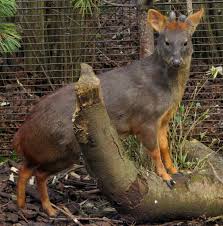Rare Pudu Fawn Offers Conservation Hope
A rare pudu fawn, named Lenga, was born in Argentina, allowing scientists to study this unique deer species. At just 1.21 kg, Lenga explores the biopark under his parents' watch. Pudus face threats from predators and are near-threatened, highlighting the importance of conservational research efforts.

A rare pudu fawn was recently born at a biopark in Argentina, presenting scientists and conservationists with a valuable opportunity to study this diminutive deer species. Weighing only 1.21 kg, the male fawn, named Lenga, navigates the park grounds under the watchful eyes of his parents.
As one of the world's smallest deer, pudus grow to just 50 cm in height and 12 kg in weight. Lenga, currently covered in white spots, will transition from breastfeeding to a herbivorous diet over the next few months. These spots serve as camouflage against predators.
With only about 10,000 pudus left, classified as near-threatened by the IUCN, the birth of Lenga is a hopeful event. Cristian Guillet from the Temaiken Foundation emphasizes that Lenga provides critical data aiding conservation efforts for pudus and similar species at risk of extinction.
(With inputs from agencies.)
- READ MORE ON:
- pudu
- fawn
- conservation
- biopark
- Argentina
- deer
- endangered
- forest
- Patagonia
- IUCN
ALSO READ
IDB Approves $300 Million Loan to Enhance Early Literacy in Argentina
Ireland's Furlong Set for Comeback Against Argentina
Crisis in Cardiology: Argentina's Heartbeat Under Threat
Argentina's Inflation Dips Below 200% Amid Austerity Measures
Wildlife Trafficking: Forest Officials Rescue Endangered Orangutan and Reptiles










